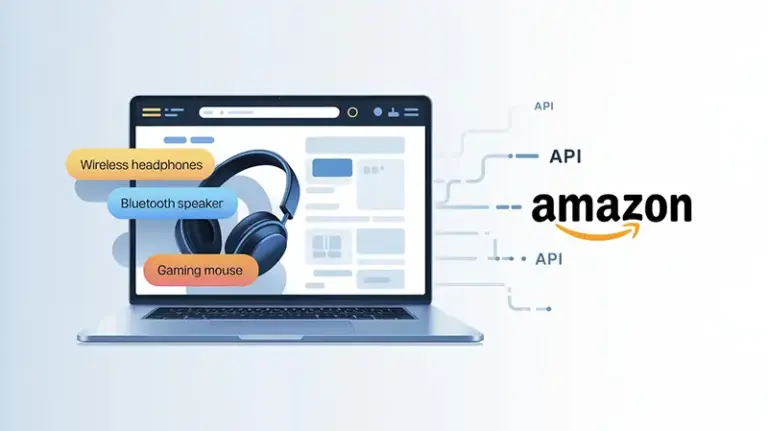In the fiercely competitive Amazon e-commerce ecosystem, keyword data is gold. Whether it’s for keyword strategy for a new product launch or in-depth insights for competitor analysis, the Amazon Keyword Scraping API has become an indispensable data acquisition tool for professional sellers and service providers. However, faced with Amazon’s constantly changing page structures and anti-scraping mechanisms, how to efficiently and stably perform bulk scraping of Amazon keywords has become a technical challenge for many e-commerce professionals.
Core Challenges in Amazon Keyword Data Scraping
1. High Technical Barriers and Expensive Development Costs
Many e-commerce sellers and tool developers often underestimate the technical difficulty when attempting to build their own Amazon keyword scraping tools. As the world’s largest e-commerce platform, Amazon’s anti-scraping mechanisms are extremely complex, including:
- Dynamic Page Structures: Amazon’s search results pages use a large amount of JavaScript rendering, making it impossible for traditional static scrapers to obtain complete data.
- IP Blocking Mechanisms: Frequent access will trigger IP restrictions, leading to interruptions in data scraping.
- CAPTCHA Interception: The system will periodically pop up CAPTCHAs, requiring manual intervention to resolve.
- Data Format Changes: The page DOM structure is frequently adjusted, requiring continuous maintenance of parsing logic.
A complete in-house team typically requires 3-5 professional engineers, with monthly costs exceeding 80,000 RMB, all while facing issues like unstable data scraping and high maintenance costs.
2. Difficulty in Guaranteeing Data Accuracy
The Amazon keyword search results page contains various types of product displays:
- Organic Search Results: Organic rankings based on keyword relevance.
- Sponsored Products Ads: Paid promotional product ads.
- Sponsored Brands Ads: Brand promotion ads.
- Amazon’s Choice Products: High-quality products recommended by Amazon.
Most self-built scrapers or existing Amazon keyword scraping tools on the market have extremely low accuracy when scraping Sponsored ad slot data, typically achieving only a 30-50% scraping rate. This data gap can severely affect the accuracy of competitor analysis and market insights.
3. Insufficient Capability for Large-Scale Scraping
E-commerce data analysis often requires large-scale, high-frequency data scraping:
- Keyword Coverage: The need to scrape search results for tens of thousands of relevant keywords.
- Timeliness Requirements: Ranking data changes frequently, requiring hourly or even minute-level data updates.
- Multi-Site Support: The need to simultaneously scrape multiple Amazon sites, such as the US, UK, Germany, and Japan.
- Historical Data Accumulation: The need to establish a foundation for long-term data trend analysis.
Traditional scraping solutions are often unable to support such large-scale demands, and costs tend to increase linearly with the volume of scraping.
Limitations of Existing Market Solutions
Drawbacks of Traditional Tools like Seller Sprite
Currently, e-commerce data tools represented by Seller Sprite, while providing certain Amazon keyword data services, have significant limitations:
- Strict API Access Limits: There are strict limits on the number of monthly API calls, which cannot meet the needs of large-scale data analysis.
- Expensive Pricing: API products are charged separately, with non-transparent pricing that is often unaffordable for small and medium-sized enterprises.
- Limited Data Dimensions: The provided fields are relatively standardized, making it difficult to meet personalized analysis needs.
- Poor Real-Time Performance: Data update frequency is low, making it difficult to capture market trends.
Challenges of Building an In-House Scraper Team
Many companies with technical capabilities choose to build their own scraper teams but face numerous challenges:
- High Talent Costs: Senior scraper engineers are expensive and have high turnover rates.
- High Technical Risks: Amazon’s anti-scraping strategies are constantly being upgraded, requiring continuous technical investment.
- High Maintenance Costs: Page structures change frequently, requiring dedicated personnel for continuous maintenance.
- Compliance Risks: Scraping frequency must be strictly controlled to avoid violating platform rules.
Pangolin Scrape API: A Professional Amazon Keyword Scraping Solution
Core Technical Advantages
The Pangolin Scrape API is specifically designed for the Amazon keyword data scraping scenario, providing an industry-leading technical solution:
1. Ultra-High Accuracy for Sponsored Ad Scraping
Through deep learning and intelligent recognition technology, Pangolin has achieved a 98% accuracy rate for Sponsored ad slot scraping, far exceeding the industry average. This means:
- Complete Bidding Data: Accurately identify paid promotional products under each keyword.
- Precise Ad Analysis: Provide a reliable data foundation for formulating PPC strategies.
- A True View of the Market Competition: Avoid analysis deviations caused by missing data.
2. Flexible Zip Code-Specific Scraping
Supports data scraping by different zip codes to meet regional operational needs:
JSON
{
"url": "https://www.amazon.com/s?k=wireless+headphones",
"parserName": "amzKeyword",
"formats": ["json"],
"bizContext": {
"zipcode": "10041" // New York area zip code
}
}
Supported major countries and zip codes:
- United States: 10041 (New York), 90001 (Los Angeles), 60601 (Chicago), 84104 (Salt Lake City)
- United Kingdom: W1S 3AS (London), EH15 1LR (Edinburgh), M13 9PL (Manchester)
- Germany: 80331 (Munich), 10115 (Berlin), 20095 (Hamburg)
- France: 75000 (Paris), 69001 (Lyon), 06000 (Nice)
3. Minute-Level Data Update Capability
Supports hourly bulk keyword data updates to capture market changes in a timely manner:
- Real-time Rank Monitoring: Track trends in keyword ranking changes.
- Competitor Dynamics Monitoring: Promptly discover competitors’ strategy adjustments.
- Promotional Activity Tracking: Monitor price and ranking changes during specific periods.
Detailed API Interface Introduction
Getting an Access Token
First, you need to log in to https://tool.pangolinfo.com/ to obtain a Bearer Token for API authentication.
Keyword Data Scraping Interface
Use the latest scrape interface (average response time of 10 seconds):
Bash
curl --request POST \
--url https://scrapeapi.pangolinfo.com/api/v1/scrape \
--header 'Authorization: Bearer <your_token>' \
--header 'Content-Type: application/json' \
--data '{
"url": "https://www.amazon.com/s?k=bluetooth+speaker",
"formats": ["json"],
"parserName": "amzKeyword",
"bizContext": {
"zipcode": "10041"
}
}'
Python Example:
Python
import requests
url = "https://scrapeapi.pangolinfo.com/api/v1/scrape"
payload = {
"url": "https://www.amazon.com/s?k=wireless+headphones",
"formats": ["json"],
"parserName": "amzKeyword",
"bizContext": {"zipcode": "10041"}
}
headers = {
"Authorization": "Bearer <your_token>",
"Content-Type": "application/json"
}
response = requests.request("POST", url, json=payload, headers=headers)
print(response.text)
JavaScript Example:
JavaScript
const options = {
method: 'POST',
headers: {
'Authorization': 'Bearer <your_token>',
'Content-Type': 'application/json'
},
body: JSON.stringify({
"url": "https://www.amazon.com/s?k=gaming+mouse",
"formats": ["json"],
"parserName": "amzKeyword",
"bizContext": {"zipcode": "90001"}
})
};
fetch('https://scrapeapi.pangolinfo.com/api/v1/scrape', options)
.then(response => response.json())
.then(response => console.log(response))
.catch(err => console.error(err));
Data Structure and Field Descriptions
The scraped Amazon keyword search results contain the following core fields:
JSON
{
"code": 0,
"message": "ok",
"data": {
"products": [
{
"asin": "B08N5WRWNW",
"title": "Echo Dot (4th Gen) | Smart speaker with Alexa",
"price": "$29.99",
"originalPrice": "$49.99",
"discount": "40%",
"star": "4.7",
"rating": "456,789",
"image": "https://m.media-amazon.com/images/I/...",
"images": ["url1", "url2", "url3"],
"sales": "10K+ bought in past month",
"isSponsored": true,
"position": 1,
"isAmazonChoice": false,
"prime": true,
"freeShipping": true
}
],
"pagination": {
"currentPage": 1,
"totalPages": 16,
"hasNextPage": true
},
"searchInfo": {
"keyword": "smart speaker",
"totalResults": "5,000+ results",
"filters": ["Brand", "Price", "Customer Rating"]
}
}
}
Bulk Scraping Functionality
For scenarios requiring the simultaneous scraping of multiple keywords or pages, Pangolin provides a dedicated batch interface:
Bash
curl -X POST http://scrapeapi.pangolinfo.com/api/v1/batch \
-H 'Content-Type: application/json' \
-H 'Authorization: Bearer your_access_token' \
-d '{
"urls": [
"https://www.amazon.com/s?k=wireless+earbuds&page=1",
"https://www.amazon.com/s?k=wireless+earbuds&page=2",
"https://www.amazon.com/s?k=bluetooth+headphones&page=1"
],
"formats": ["json"],
"bizContext": {
"zipcode": "60601"
}
}'
Practical Application Scenarios and Case Studies
1. Competitor Analysis and Market Research
- Scenario: A fitness equipment brand needs to analyze the market competition for the “yoga mat” category.
- Solution:
- Scrape core keywords: “yoga mat”, “exercise mat”, “fitness mat”, etc.
- Analyze Sponsored ad placement strategies and budget distribution.
- Monitor seasonal demand changes and price trends.
- Identify emerging competitors and popular products.
Implementation Code Example:
Python
import requests
import json
def analyze_yoga_mat_market():
keywords = [
"yoga mat", "exercise mat", "fitness mat",
"non slip yoga mat", "thick yoga mat"
]
results = {}
for keyword in keywords:
url = f"https://www.amazon.com/s?k={keyword.replace(' ', '+')}"
payload = {
"url": url,
"parserName": "amzKeyword",
"formats": ["json"],
"bizContext": {"zipcode": "10041"}
}
response = requests.post(
"http://scrapeapi.pangolinfo.com/api/v1",
headers={
"Content-Type": "application/json",
"Authorization": "Bearer your_token"
},
json=payload
)
results[keyword] = response.json()
return results
# Analyze the sponsored ad ratio
def analyze_sponsored_ratio(results):
for keyword, data in results.items():
products = data['data']['products']
sponsored_count = sum(1 for p in products if p.get('isSponsored', False))
total_count = len(products)
ratio = (sponsored_count / total_count * 100) if total_count > 0 else 0
print(f"{keyword}: Sponsored ads ratio = {ratio:.1f}%")
2. PPC Advertising Strategy Optimization
- Scenario: An electronics seller needs to optimize their PPC placement strategy for “wireless charger” products.
- Solution:
- Monitor competitors’ ad rankings and bidding strategies in real time.
- Analyze ad display performance during different time periods.
- Identify the level of competition for high-conversion keywords.
- Develop precise placement strategies and bidding recommendations.
3. Keyword Strategy for New Product Launches
- Scenario: A home goods brand is preparing to launch a new smart table lamp on Amazon.
- Solution:
- Scrape the search results for all popular keywords in the relevant category.
- Analyze the title keyword distribution of successful products.
- Identify opportunities for long-tail keywords.
- Develop an optimal product title and keyword strategy.
Cost-Benefit Analysis
In-House Team vs. Pangolin API
| Comparison Dimension | In-House Scraper Team | Pangolin Scrape API |
| Initial Investment | 500k – 1M RMB | Start with just a few thousand RMB |
| Monthly Operating Cost | 80k – 150k RMB | Flexible, based on usage |
| Technical Maintenance | Requires 3-5 engineers | Zero maintenance, automatic updates |
| Data Accuracy | 30-70% | 98% (for ad slots) |
| Scalability | Costs increase linearly | Decreasing marginal cost |
| Time to Launch | 3-6 months | Can be integrated in 1 day |
| Compliance Risk | Requires self-management | Platform-level risk management |
ROI Calculation Example
Take a medium-sized e-commerce service provider as an example:
- Business Need: Scrape search result data for 10,000 keywords daily.
- Pangolin API Cost: 1 credit per call, monthly fee of approximately 20,000 RMB.
- In-House Team Cost: Engineer salaries + servers + maintenance, monthly fee of approximately 120,000 RMB.
- ROI Improvement: 83% cost savings, 40% improvement in data accuracy.
Target User Group Analysis
1. E-commerce Data Service Providers
- Typical Characteristics:
- Provide data analysis and operational services to Amazon sellers.
- Require large-scale, high-frequency data scraping capabilities.
- Have extremely high requirements for data accuracy and timeliness.
- Want to avoid technical development investment and focus on business innovation.
- Why it’s a good fit:
- Can quickly expand data service capabilities.
- Significantly reduces technical development and maintenance costs.
- Allows for offering differentiated data service products.
- Supports white-labeling and customization needs for the API.
2. Large E-commerce Sellers and Brands
- Typical Characteristics:
- Have a large number of SKUs and ad placements on the Amazon platform.
- Require detailed competitor analysis and market monitoring.
- Have professional data analysis teams.
- Seek personalized data solutions.
- Why it’s a good fit:
- Supports data scraping for multiple sites and categories.
- Provides in-depth data dimensions for competitive analysis.
- Can be integrated into existing data analysis workflows.
- Supports real-time monitoring and alerting functions.
3. E-commerce Tools and SaaS Platforms
- Typical Characteristics:
- Provide tool-based products for e-commerce sellers.
- Need a stable and reliable data source.
- Want to iterate on product features quickly.
- Focus on user experience and data quality.
- Why it’s a good fit:
- Provides standardized API interfaces that are easy to integrate.
- Has a clear data structure, facilitating secondary development.
- Supports high-concurrency access and elastic scaling.
- Offers complete technical documentation and code examples.
In-depth Analysis of Technical Advantages
1. Intelligent Anti-Anti-Scraping Mechanism
Pangolin employs a multi-layered, intelligent anti-anti-scraping technology:
- Dynamic User-Agent Rotation: Simulates real user behavior patterns.
- Distributed IP Pool Management: Tens of thousands of high-quality residential IPs worldwide.
- Intelligent Request Frequency Control: Optimal request strategy based on machine learning.
- Automatic CAPTCHA Handling: AI-based recognition and automated processing workflows.
2. Data Parsing Engine
An intelligent parsing engine developed specifically for the characteristics of Amazon pages:
- DOM Structure Self-Adaptation: Automatically adapts to changes in page structure.
- Multi-language Support: Supports over 20 Amazon sites worldwide.
- Fault Tolerance Mechanism: Intelligent handling of page anomalies.
- Real-time Updates: 24/7 monitoring of page changes and automatic updates to parsing rules.
3. Data Quality Assurance
A multi-dimensional data quality control system:
- Real-time Data Validation: Data consistency checks during the scraping process.
- Multi-Source Data Comparison: Verifying data accuracy through different paths.
- Historical Data Comparison: Identifying abnormal data based on historical trends.
- Manual Quality Inspection: Manual sampling and verification of key data.
Industry Development Trends and Outlook
1. AI-Driven Data Analysis
With the development of artificial intelligence technology, Amazon keyword data scraping is moving in a more intelligent direction:
- Intelligent Keyword Recommendations: Automatically discover potential opportunity keywords based on search data.
- Trend Prediction Analysis: Use machine learning to predict trends in keyword ranking changes.
- Automated Placement Suggestions: Automatically generate PPC placement strategies based on data analysis results.
- Personalized Data Services: Provide customized data solutions based on user business characteristics.
2. Multi-Platform Data Integration
Future e-commerce data services will no longer be limited to a single platform:
- Cross-Platform Comparative Analysis: Integration of data from platforms like Amazon, Walmart, and eBay.
- Omnichannel Data Monitoring: Unified management of online and offline data.
- Social Media Integration: Comprehensive analysis combining data from social platforms.
- Supply Chain Data Linkage: Connecting data across the entire chain from production to sales.
3. Real-Time and Granularity
Data services will evolve towards higher real-time performance and finer granularity:
- Second-Level Data Updates: Real-time monitoring and alerting for key metrics.
- Micro-level Data Granularity: More detailed data dimensions and analysis angles.
- Personalized Recommendation Algorithms: Intelligent recommendation systems based on user behavior.
- Automated Decision Support: Fully automated processes from data to decision.
Best Practice Recommendations
1. Data Scraping Strategy Planning
Before using an Amazon keyword scraping API, it is recommended to develop a clear data strategy:
Keyword Selection Principles:
- Prioritize scraping high-frequency keywords related to the core business.
- Cover long-tail keywords to discover new opportunities.
- Regularly evaluate the business value and competition level of keywords.
- Establish a tiered keyword management system.
Scraping Frequency Planning:
- Core Keywords: Update once per hour.
- Important Keywords: Update 2-3 times per day.
- Long-tail Keywords: Update 1-2 times per week.
- Seasonal Keywords: Adjust based on the business cycle.
2. Data Processing and Analysis
The value of raw data can only be realized through professional analysis:
Data Cleaning:
- Remove invalid and abnormal data points.
- Unify data formats and field standards.
- Establish a data quality assessment mechanism.
- Set up monitoring for abnormal data changes.
Analysis Dimension Design:
- Time Trend Analysis: Ranking changes, price fluctuations, review count growth.
- Competitive Landscape Analysis: Market share, ad investment, product positioning.
- User Behavior Analysis: Search preferences, purchasing decision factors.
- Market Opportunity Analysis: Untapped categories, emerging needs, price ranges.
3. Risk Management
When conducting large-scale data scraping, it is necessary to be aware of the associated risks:
Compliance Risks:
- Strictly adhere to Amazon’s terms of use.
- Control the scraping frequency to avoid putting pressure on the platform.
- Protect user privacy and do not scrape sensitive personal information.
- Establish internal compliance processes for data usage.
Technical Risks:
- Establish data backup and disaster recovery mechanisms.
- Set API call rate limits and error retries.
- Monitor data quality to promptly detect anomalies.
- Maintain technical communication with the API service provider.
Summary and Outlook
The Amazon Keyword Scraping API, as a fundamental infrastructure for e-commerce data analysis, is reshaping the competitive landscape of the entire industry. From traditional manual analysis to intelligent data-driven decision-making, and from single-dimensional monitoring to multi-dimensional in-depth insights, the value of data is being redefined and unleashed.
With its 98% accuracy rate for ad slot scraping, minute-level data update capability, and a complete solution system, the Pangolin Scrape API provides a reliable and efficient data acquisition platform for e-commerce professionals. Whether you are a large seller hoping to break free from reliance on traditional tools or a data service provider committed to offering differentiated services, you can find a suitable solution on this platform.
With the continuous development of technologies like artificial intelligence and machine learning, Amazon keyword data scraping will become more intelligent and automated. The future competition will no longer be about who can obtain the data, but who can better understand and utilize it. In this transformation process, choosing a professional, stable, and constantly evolving data scraping platform will be a key factor for business success.
For businesses and developers currently looking for an Amazon keyword scraping tool, it is recommended to first clarify your data needs and business goals, and then choose the most suitable technical solution. Whether you are a startup hoping for a quick launch or a mature enterprise requiring large-scale customized services, the right data scraping solution will become a significant driver of business growth.
In the data-driven e-commerce era, mastering high-quality keyword data means seizing the market initiative. Let us embrace this data-filled era of opportunity together, using professional tools and intelligent analysis to stand out in the fierce e-commerce competition.




